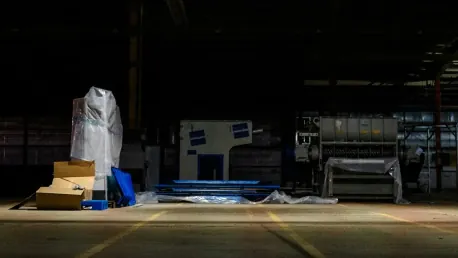The manufacturing industry is undergoing a monumental transformation in 2024, driven by sweeping changes in logistics, a heightened focus on sustainability, and an increasing reliance on flexible work arrangements. These shifts are not only reshaping how businesses operate but also how they approach everything from supply chain management to contractual processes. The push towards more efficient and adaptable systems is evidenced by a remarkable surge in the search for multimodal transport contracts, rising by an astonishing 450%. This trend highlights an urgent demand for smoother, more flexible global trade operations to address today’s supply chain disruptions and to better position firms to handle future challenges.
Further catalyzing this industry transformation is the rise in sustainable manufacturing practices. Evidence of this shift can be seen in the 50% increase in environmental impact assessments and the 100% surge in renewable energy agreements. Market demand for cleaner operations, alongside intensified regulatory pressure, signals a growing commitment to sustainable practices. This shift is not only driven by external stakeholders but is increasingly internalized by companies as they seek to innovate their production methods in an environmentally responsible manner. This trend underscores a significant move towards operational sustainability that promises long-term benefits for both the planet and participating enterprises.
The Transformation of Logistics
In 2024, the logistics industry within the manufacturing sector is experiencing a major overhaul. Companies are looking for more efficient and flexible ways to manage their global supply chains. This necessity is driving a significant 450% increase in searches for multimodal transport contracts. Multimodal transport combines various modes of transportation, such as rail, sea, and road, to create seamless logistics solutions. The spike in demand for these contracts is a direct response to ongoing supply chain disruptions, forcing businesses to rethink and restructure their logistics processes. Efficient multimodal transport systems are becoming crucial for maintaining smooth cross-border trade operations and mitigating delays.
Streamlining logistics and adopting more flexible transportation contracts can significantly reduce operational bottlenecks, saving both time and costs. The emphasis on flexibility ensures that companies can quickly adapt to changing market dynamics and unforeseen disruptions. Furthermore, the complexity of global supply chains necessitates the use of advanced technology and data analytics to manage logistics efficiently. Enhanced real-time tracking and predictive analytics are becoming essential tools for companies aiming to maintain a competitive edge in a fast-paced, ever-changing market. This technological integration helps in forecasting potential issues and optimizing supply chain performance.
Sustainability as a Driving Force
Sustainable practices are increasingly becoming a central focus within the manufacturing industry, as evidenced by a notable 50% rise in environmental impact assessments and a 100% increase in renewable energy agreements. Environmental sustainability is no longer a peripheral concern; it is deeply embedded in business strategies. The sharp rise in environmental impact assessments suggests that companies are taking proactive steps to evaluate and mitigate their ecological footprint. This movement is further supported by stringent regulations and evolving customer preferences that prioritize environmental responsibility. Adopting sustainable practices not only enhances a company’s public image but also opens up new market opportunities and avenues for growth.
Additionally, the dramatic increase in renewable energy agreements reflects a broader industry shift towards cleaner energy sources. Manufacturers are increasingly committing to renewable energy to power their operations, driven by both regulatory requirements and the need to meet internal sustainability goals. This commitment helps reduce greenhouse gas emissions and dependency on fossil fuels. As a result, the industry’s overall carbon footprint is diminishing, contributing significantly to global sustainability goals. The focus on sustainability is also driving innovation and the development of new technologies aimed at reducing waste, improving energy efficiency, and recycling materials.
Flexible Work Arrangements
Economic uncertainty and fluctuating market conditions have led to a significant rise in flexible work arrangements within the manufacturing sector. The demand for seasonal employment has grown by 143%, while zero-hour contracts have increased by 50%, indicating a shift towards a more agile workforce. This flexibility allows businesses to scale their labor force in response to market demands, mitigating the risks associated with economic volatility. Flexible contracts, which have seen a 52% overall increase, enable companies to maintain operational efficiency without committing to long-term employment obligations. This trend also reflects a broader societal shift towards more adaptable employment models that cater to both employer and employee needs.
Moreover, the rise in flexible work arrangements is not just about economic pragmatism; it is also about employee satisfaction and workplace culture. According to Alex Denne, Head of Growth at Genie AI, nearly 50% of employees value flexibility in their work arrangements, making it a crucial component of modern human resource strategies. Businesses that offer flexible work options are likely to attract and retain top talent, fostering a more motivated and productive workforce. This responsiveness to employee preferences helps build a positive workplace culture, contributing to overall organizational success. It also reflects a growing understanding that work-life balance is essential for employee well-being and long-term productivity.
The Role of Genie AI in Legal Transformation
In 2024, the manufacturing industry is experiencing a monumental transformation driven by significant changes in logistics, a strong focus on sustainability, and an increasing reliance on flexible work arrangements. These shifts are redefining how businesses operate and manage their supply chains and contractual processes. One clear indicator of this transformation is the remarkable 450% surge in demand for multimodal transport contracts, highlighting the urgent need for smoother, more adaptable global trade operations to tackle current supply chain disruptions and prepare for future challenges.
Additionally, sustainable manufacturing practices are on the rise, evidenced by a 50% increase in environmental impact assessments and a 100% surge in renewable energy agreements. This marks a growing commitment to cleaner operations, driven both by market demand and intensified regulatory pressures. Companies are increasingly internalizing these practices, innovating their production methods to be more environmentally responsible. This significant shift towards operational sustainability promises long-term benefits for both the planet and the enterprises involved, signaling a future where sustainable practices are at the core of manufacturing.









